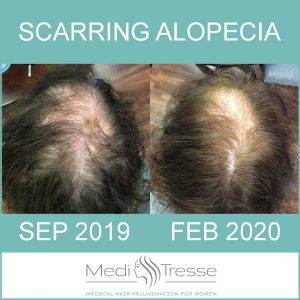
Over the years we have noticed an increase in the number of patients with Scarring Alopecia. While part of the reason for this is that the medical community is becoming better at identifying, we also do believe that the incidence of scarring alopecia is increasing. There is some evidence that certain harsh hair care practices may contribute to some forms of Scarring Alopecia, such as the use of chemical relaxers from a very young age. This type of hair loss is much more common in women than men, with some studies reporting as high as a 4:1 ratio of women to men. There is some evidence to suggest an autoimmune cause, and there may be a genetic component as well, but more research definitely needs to be done.
There are several types of Scarring Alopecia, with the most common being Central Centrifugal Cicatricial Alopecia (CCCA), Lichen PlanoPilaris (LPP), and Frontal Fibrosing Alopecia (FFA). As Scarring Alopecia can be permanent, our goal with any patient that we believe may have a Scarring Alopecia is to quickly confirm the diagnosis and aggressively start treatment. About one year ago we significantly adjusted our treatment approach for Scarring Alopecia to include oral doxycycline and topical clobetasol. We are excited to say that this approach has proven to be quite beneficial to our patients. For a long time the goal of treatment with Scarring Alopecia was to stop the further progression of hair loss as the loss was often permanent. However, we have many patients on our new regiment that are experiencing some regrowth. While it is impossible to know if regrowth will occur, we are very excited to see how often our Scarring Alopecia patients are seeing positive results.
If you have been diagnosed with a Scarring Alopecia we highly recommend seeing a medical practitioner that is experienced with treating this type of hair loss.
Posted by Your Medi Tresse Team
The content contained herein is for education only and should not be considered medical advice. Medical advice may only be given through a one-on-one, private consultation with an appropriate licensed medical provider.